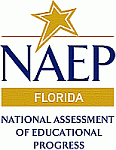NAEP Results

Florida NAEP Score and Achievement Level Reports
- 2024 NAEP Mathematics
- 2024 NAEP Reading
- 2022 NAEP Mathematics
- 2022 NAEP Reading
- 2019 NAEP Mathematics
- 2019 NAEP Reading
- 2017 NAEP Mathematics
- 2017 NAEP Reading
- 2015 NAEP Science
- Trial Urban District Assessment 2024 - Duval, Hillsborough, Miami-Dade, and Orange Counties
- Trial Urban District Assessment 2022 - Duval, Hillsborough, and Miami-Dade Counties
NAEP Data Explorer (NDE)
The NDE is an interactive tool that can be used by the public to analyze results and to create statistical tables, charts, and maps. The NDE can also be used to explore assessment results by subject area over time for various subjects, grades, and jurisdictions. Data from contextual factors related to learning that are covered in the student questionnaires are also available via the NDE.
NAEP Achievement Levels and Scoring Metrics
NAEP provides results on subject-matter achievement, instructional experiences, and school environment. Additionally, reports are released examining how NAEP results have changed over time using scale scores and achievement levels (Basic, Proficient, and Advanced).
NAEP scores are based on results of representative samples of schools and students, and each student takes only a portion of the assessment. Results are then assembled to form projected national, state, and TUDA results. Federal law requires that NAEP data on individual students and schools remain confidential.
Results are reported by student groups, with a primary focus on these key demographics:
- Gender
- Race
- Ethnicity
- Eligibility for National School Lunch Program (NSLP)
- English Language Learners (ELL)
- Participation in exceptional student education programs (SD)
- Populations of students, e.g. Grade 4 students
Subject-matter achievement is reported in two ways—average scale scores and the percentages of students performing at achievement levels based on scale scores.
Differences between scores or between percentages are discussed only when they are significant from a statistical perspective. Some seemingly large differences may not be statistically significant.
Score scales are 0 to 500 for mathematics and reading and 0 to 300 for science and writing. Scale scores are reported as averages and as percentiles (10th, 25th, 50th, 75th, and 90th). Because NAEP scale scores are reported as group averages, they may obscure progress or problems related to school performance across a distribution of scores.
Because NAEP scales and achievement levels are developed independently for each subject, student performance cannot be compared across subjects. However, these reporting metrics facilitate performance comparisons within a subject from year to year and from one group of students to another in the same grade.
There are three achievement levels:
- Basic—Partial mastery of prerequisite knowledge and skills that are fundamental for proficient work at a given grade; States often define Basic as adequate for promotion. NAEP defines Basic as less than mastery of but more than minimal competency in a subject.
- Proficient—Solid academic performance and competence over challenging subject-matter knowledge, application of such knowledge to real-world situations, and analytical skills appropriate to the subject matter. Whereas states often define "proficiency" as solid grade-level performance, NAEP's policy definition of its "Proficient" achievement level is "competency over challenging subject matter" and is implicitly intended to indicate higher than grade-level performance.
- Advanced—Superior performance.
Below Basic is also reported but not considered an achievement level.
Florida NAEP results are collected in reports that focus on average scale scores and the percentages of students performing at or above Basic and Proficient.
Authorized by NAEP legislation and adopted by the National Assessment Governing Board (NAGB), the three achievement levels are determined by cut points based on the collective judgments of experts about what students should know and be able to do. Results show how different groups are performing in relation to each other and over time.
- Setting Achievement Levels
- Achievement Level Descriptions by Grade - Mathematics
- Achievement Level Descriptions by Grade - Reading
- Achievement Level Descriptions by Grade - Writing
- Achievement Level Descriptions by Grade - Science
- Analysis and Scaling Metrics
Beginning in 2003, NAEP reading and mathematics state assessment scores for the 4th and 8th grades began providing an alternative measure of state educational progress as required by the No Child Left Behind Act (NCLB) of 2001.
Contact
Tamika Brinson
NAEP State Coordinator
Florida Department of Education
Email: Tamika.Brinson@fldoe.org
Phone: 850-245-0787